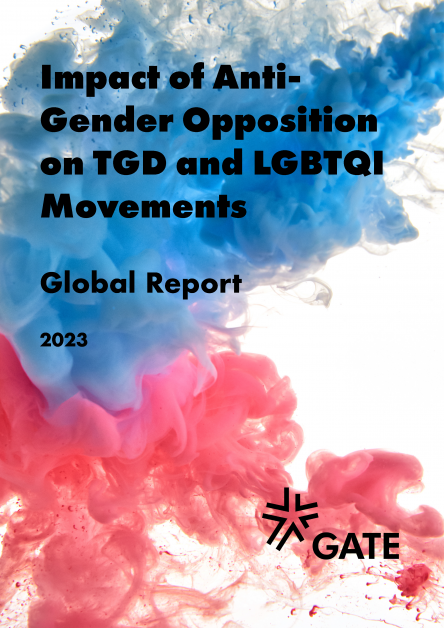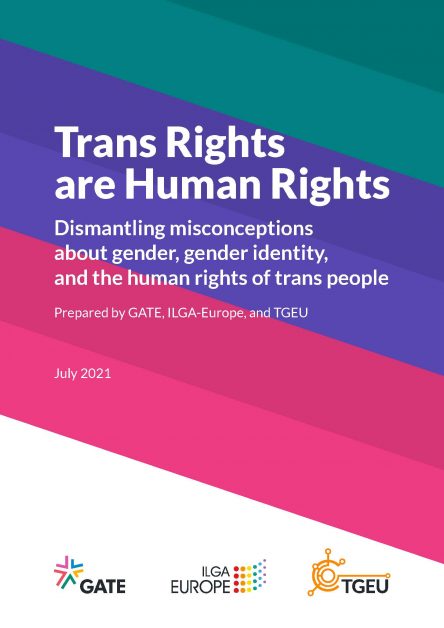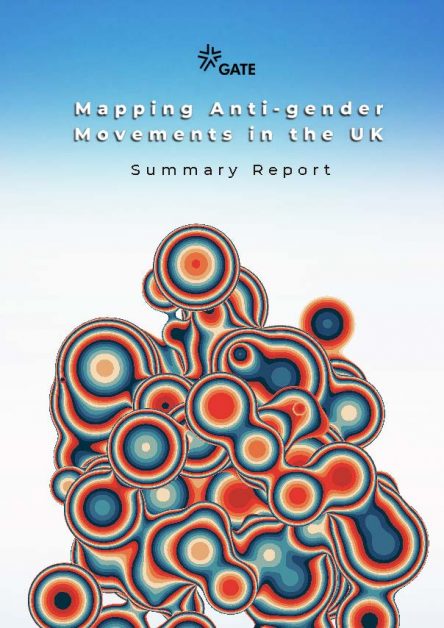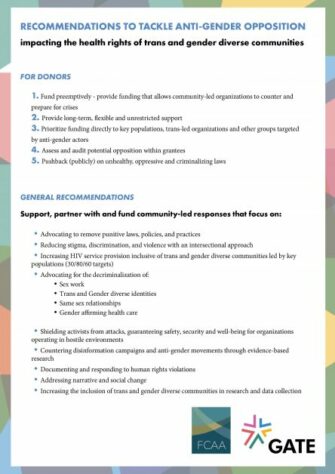The impact of anti-gender opposition (and, more specifically, anti-trans opposition) on the health rights of trans and gender diverse populations is an area of increasing concern, as stigma, discrimination, and inequality drive health inequality. In an effort to counteract these movements and increase knowledge and awareness on the topic, GATE held a Satellite Symposium at the Fast Track Cities 2023 Conference in Amsterdam to provide information on how global health bodies can respond.
The session was moderated by GATE’s Executive Director, Erika Castellanos, who opened by introducing the speakers and the main aims of the presentation (as outlined above)
Anwar Ogrm, GATE’s Movement Building Lead, opened the dialogue by clarifying the nature of the movement and its impact on our communities:
“Anti-gender movements can be defined as individuals and organizations who frame progressive discussions around gender and gender identity as manifestations of a dangerous ideology that undermine ‘traditional’ values, nations, families, order, common sense, and ‘natural’ ideas about sex, the body, and biology.”
Highlighting the rise in coordinated attacks on trans rights and trans movements over the past decade, he defined the core characteristics of these actions in order to enhance the audience’s capacity to identify similar actors in their contexts. He outlined common characteristics of these movements, such as their focus on ‘contentious’ gender and sexuality issues, their connection with broader anti-progressive movements (such as racist, anti-migrant, anti-Semitic, white nationalist, and/or pro-imperialism groups, and male supremacist, misogynistic, and/or men’s rights activist groups), and their association with right-wing populist, conservative, authoritarian, and fundamentalist religious blocks. Highlighting the impact of anti-gender movements on restricting LGBTIQ+ rights and feminist organizing in several regions of the globe, he provided an overview of the rhetoric used by these actors in their efforts to ‘restore’ and legitimize traditional economic and social hierarchies:
- Using language such as “social change has gone too far” or “civil society has overreached” (e.g., as in attacks on ‘political correctness’);
- Focusing on a need for greater social order/hierarchy, discipline, and a wide-scale ‘return’ to “common sense” or ‘traditional’ values.
Anwar wrapped up his presentation by sharing references to some of GATE’s valuable resources to better understand these issues:
Antons Mozalevskis, Technical Officer for Key Populations at the World Health Organization (WHO), introduced the health needs of trans and gender diverse communities, sharing that WHO is currently in the process of developing wider consolidated guidelines specifically on trans and gender diverse health care interventions. Below, you can see the data presented that highlights the higher relative risk of being infected with HIV faced by trans and gender diverse communities, particularly trans women.
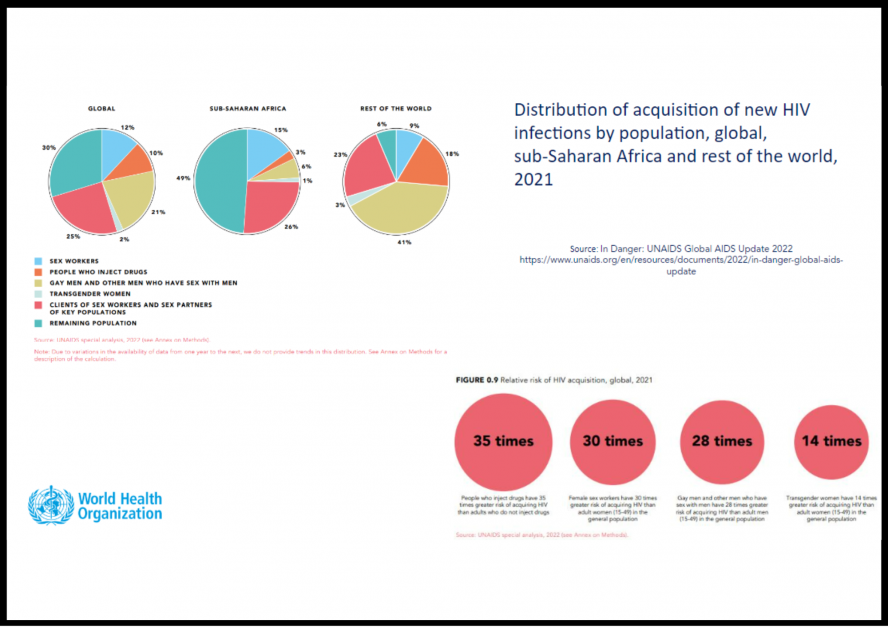
Drawing on WHO data, Antons emphasized how crucial it is to prioritize key populations and the inclusion of trans and gender diverse data to develop recommendations’ packages of interventions for prevention, testing and treatment of sexually transmitted infections. He highlighted GATE’s collaborative study as a baseline for understanding trans and gender diverse communities’ values and preferences for HIV, Hepatitis and STI services, which was used, alongside other Key Population studies conducted by INPUD, MPact and NSWP, to inform the WHO Key Population Consolidated Guidelines for HIV Prevention.
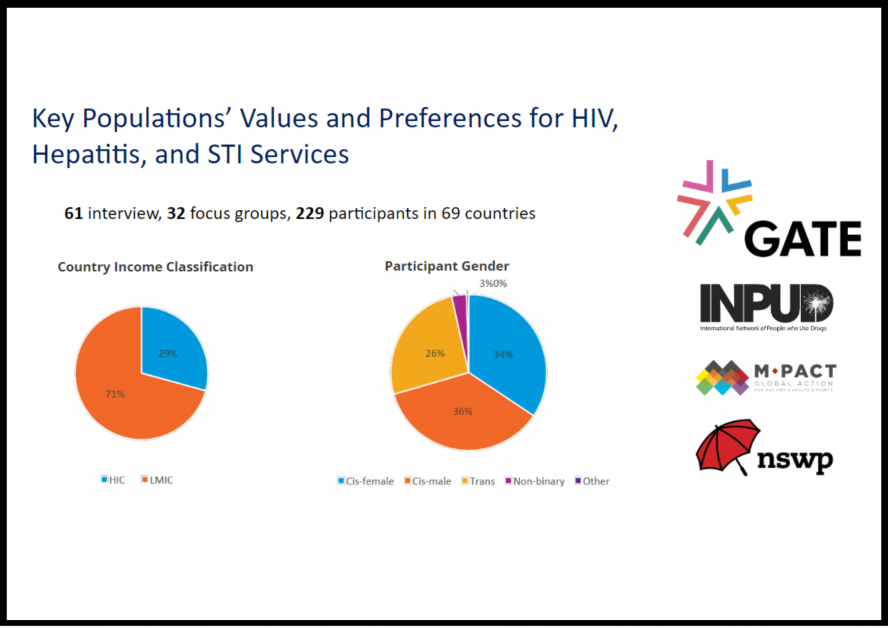
The forthcoming WHO publication (to be published later in 2023) on the recommended package of enabling health interventions for trans and gender diverse people will draw upon the findings from this and other research, and, once published, will be available on the WHO webpage on trans and gender diverse people, a summary of which can be seen below.
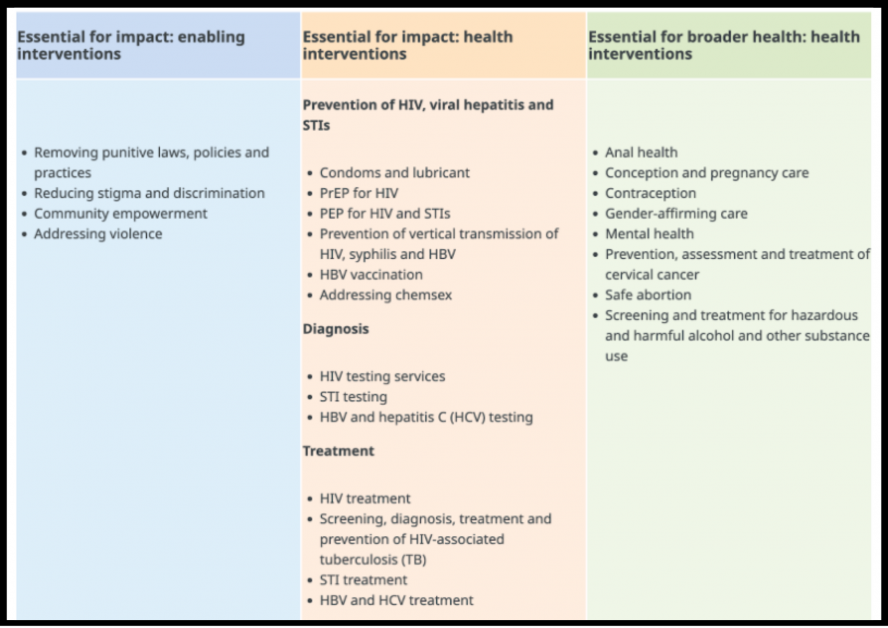
Anil Padavatan, GATE Health Program Officer, continued with evidence in the health sector by setting out some well-established facts:
- discrimination and inequality are major drivers of HIV and other health threats;
- stigma and discrimination in health care systems remain a major barrier to access to care for TGD persons and to control HIV (and other public health threats);
- responses need to reach the most marginalized populations (including trans migrants and refugees and trans sex workers);
- community-led organizations documenting human rights violations need support for safety and security;
- we need research on decriminalization as the most cost-effective way to improve access to HIV services.
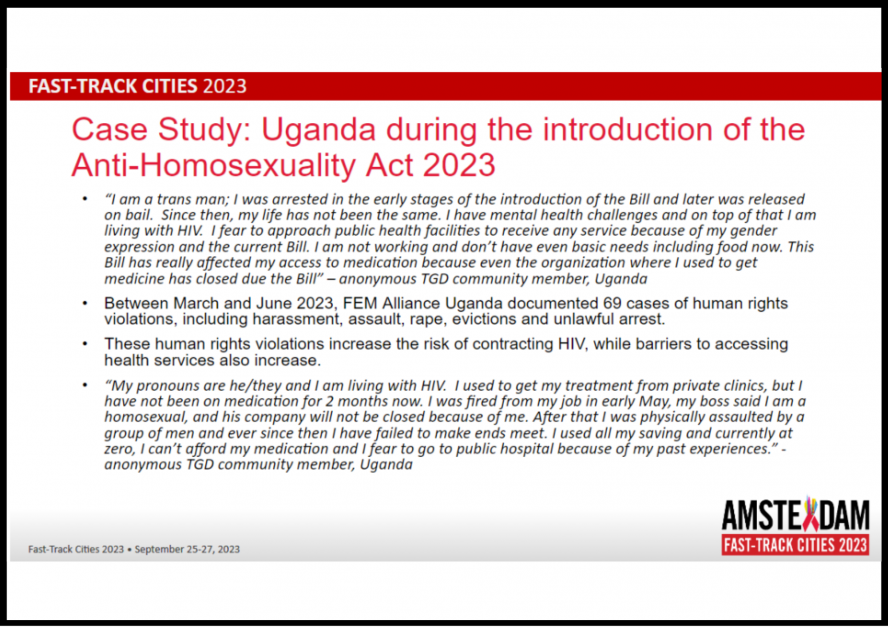
Focusing on the impact of the anti-gender movement on the global HIV response, Anil highlighted Uganda case study that demonstrates the horrifying incidence rate of trans men being subjected to so-called ‘corrective rape,’ which refers to “the idea that you can, somehow, rape people and basically turn them into women.” These attacks and human rights violations make TGD persons more vulnerable to HIV. Meanwhile, the barriers to accessing health care are increasing.
A key takeaway from Anil’s presentation was the need for innovative approaches to counter the very organized and well-funded disinformation campaigns perpetuated by the anti-gender movement – traditional public education and information strategies are no longer effective against such targeted crusades.
Moving onto how to respond to anti-gender opposition, Masen Davis, Executive Director of Funders Concerned About AIDS (FCAA), described the anti-gender movement as:
“rights reversals radicals, equality menace movements, democracy erosion extremists, social progress saboteurs – at the end of the day these are equality underminers. This is not just an anti-gender movement, but a well-resourced network of organizations and donors trying to establish a certain worldview based on authoritarian beliefs and religious extremism”.
Highlighting the discrepancy between funding distribution between anti-gender movements and LGBTI organizations, Masen presented an interesting comparison table on how anti-progressive versus progressive organizations tend to be funded, pointing out the changes that donors need to make to efficiently support community-led organizations. For more information on resource tracking, see FCAA’s report Philanthropic Support to Address HIV and AIDS in 2021.
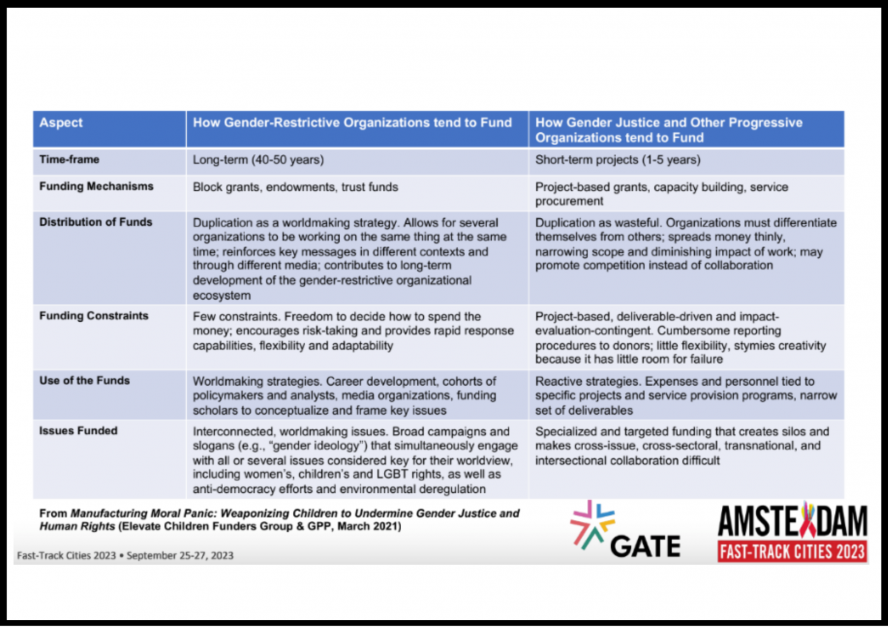
Masen concluded by strongly recommending that LGBTIQ+ organizations and donors should “get together, have conversations, and cooperate in a more coordinated way”. Lastly, Cleiton Euzebio de Lima, Senior Advisor at UNAIDS, raised awareness of evidence around stigma and discrimination impacting LGBTIQ+ health care access Sharing significant statistics, he indicated that 72% of transgender people reported experiences of stigma and discrimination in the past six months and that transgender people who have experienced stigma in health care are three times more likely to avoid accessing necessary health services.
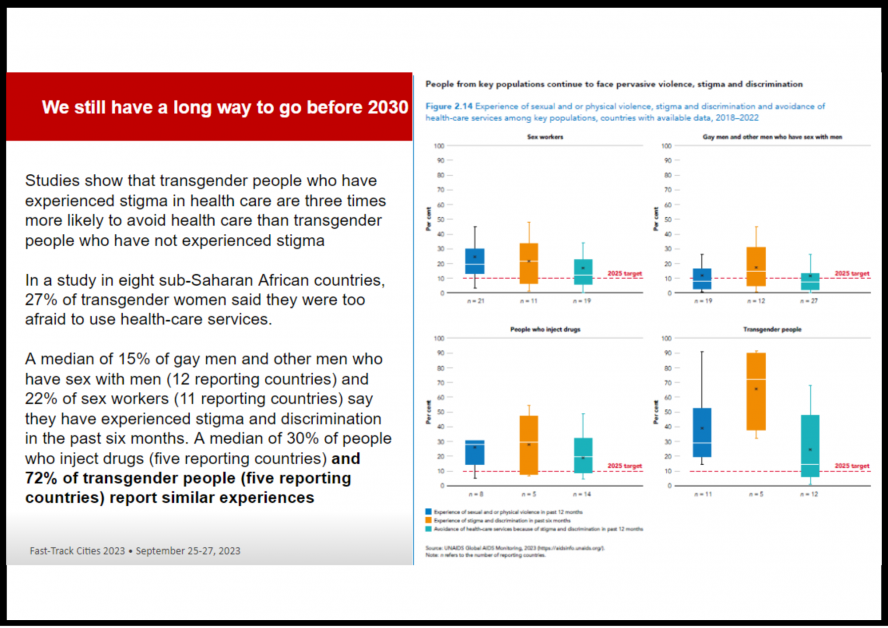
Cleiton also clarified how the global pushback on gender, LGBTI rights, and Sexual and Reproductive Health Rights is threatening the progress of the 10-10-10 targets through criminative laws, increased violence, and rhetoric in media, including from State leaders. To conclude, he highlighted some recommendations from the UNAIDS thematic segment background paper that will help understand and counter the anti-gender movements.
Closing the session, Erika Castellanos provided space for an interactive dialogue with questions and answers. and addressed concerns about how to make necessary changes to shift the anti-gender movements’ impact on the health rights of trans and gender diverse people.
GATE, in collaboration with WHO, UNAIDS, and FCAA, has prepared a set of recommendations to help donors and other key stakeholders support, partner with, and fund community-led responses.




![Speakers at Fast Track Cities Conference 2023 from left to right: Cleiton Euzebio de Lima (UNAIDS) [joined virtually], Masen Davis (FCAA), Antons Mozalevskis (WHO), Erika Castellanos (GATE), Anwar Ogrm (GATE) and Anil Padavatan (GATE)](https://gate.ngo/wp-content/uploads/2024/01/all-speakers-FTC-1116x628-1-750x500.png)

